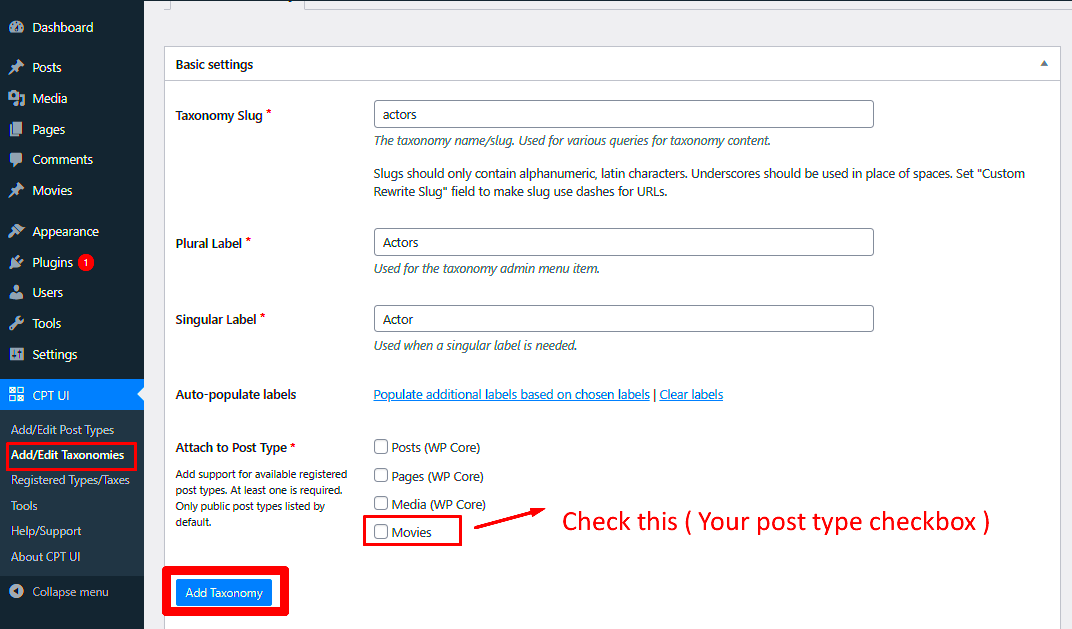Structured data is a way to organize your content in a format that search engines understand better. Think of it as adding a layer of information to your content, making it easier for search engines like Google to interpret and present it more attractively in search results. By using structured data, you can transform how your WordPress custom post types appear, showing rich snippets like ratings, FAQs, and more. This means higher visibility and a better chance of attracting clicks to your website.
Benefits of Adding Structured Data to WordPress Custom Post Types

Adding structured data to your WordPress custom post types offers several advantages. Here’s why you should consider implementing it:
- Enhanced Search Visibility: Structured data can help your content stand out in search results with rich snippets, increasing click-through rates.
- Improved SEO Performance: Search engines can better understand your content, which may lead to higher rankings over time.
- More Engaging Search Results: Displaying elements like ratings, images, and FAQs directly in search results makes your posts more engaging.
- Voice Search Optimization: Structured data improves your chances of being featured in voice search results, which are becoming increasingly popular.
- Boosted Local SEO: If you have a business website, structured data can help highlight key details like business hours, location, and contact info.
These benefits not only improve your website’s SEO but also enhance the user experience, making your content more accessible and appealing to your audience.
Choosing the Right Schema Markup for Your Custom Post Types
Selecting the correct schema markup is crucial because it ensures your custom post types are accurately represented in search engine results. Here are some popular schema types you might consider:
| Schema Type | Best Use Case |
|---|---|
| Article | Ideal for blog posts, news articles, and guides. |
| Product | Perfect for showcasing individual products, complete with prices and reviews. |
| FAQ | Useful for pages with frequently asked questions to enhance visibility. |
| Recipe | Best for food-related posts that include ingredients, cooking time, and nutritional information. |
| Event | Great for listing events with dates, locations, and ticket information. |
To determine the best schema markup, think about the content type and how you want it to appear in search results. If you’re sharing a tutorial or guide, the HowTo schema could be beneficial. For a portfolio item, consider using the CreativeWork schema to highlight unique projects. By aligning your custom post type with the right schema, you make it easier for search engines to understand your content, which can ultimately lead to better search rankings.
Ways to Add Structured Data to WordPress Without Plugins
If you prefer a hands-on approach, adding structured data to your WordPress site manually can give you more control. This method requires some knowledge of coding, but it’s worth it if you want to avoid using too many plugins. Here are a few ways you can implement structured data manually:
- Adding JSON-LD Code in Theme Files: The easiest way to add structured data is by using JSON-LD, which is Google’s preferred format. You can include this code in your theme’s
header.phporfooter.phpfile. Simply wrap your structured data in a<script type="application/ld+json">tag. - Using Custom Fields: If you’re using custom post types, you can create custom fields to store structured data. This method is ideal for advanced users who want to embed schema directly into posts.
- Using Functions.php: Another way is to add structured data through your theme’s
functions.phpfile. You can create a custom function to output the schema on specific pages or post types.
Here’s a quick example of JSON-LD code for a blog post:
<script type="application/ld+json">
{
"@context": "https://schema.org",
"@type": "BlogPosting",
"headline": "Your Blog Post Title",
"author": {
"@type": "Person",
"name": "Your Name"
},
"datePublished": "2024-11-12",
"mainEntityOfPage": {
"@type": "WebPage",
"@id": "https://yourwebsite.com/post-url"
}
}
</script>
Adding structured data manually can be a bit technical, but it offers greater flexibility and can be optimized for your specific needs.
Using Plugins to Implement Structured Data in WordPress
If coding isn’t your thing, using a plugin is a hassle-free way to add structured data to your WordPress site. There are several reliable plugins available that can help you set up schema markup without any technical know-how. Here are some popular options:
- Yoast SEO: This popular SEO plugin comes with built-in support for structured data, allowing you to add schema markup like breadcrumbs, articles, and FAQs effortlessly.
- Schema Pro: If you need more advanced features, Schema Pro offers support for custom post types, product schemas, and more, making it perfect for e-commerce sites.
- Rank Math: This SEO plugin provides comprehensive schema support, including local SEO, reviews, and how-to schemas, all with an easy-to-use interface.
- All In One Schema Rich Snippets: This lightweight plugin focuses on adding rich snippets like ratings, events, and recipes, helping your content stand out in search results.
Using plugins is great for beginners or those who want a quick and easy solution. They often come with pre-built templates and settings that automate the process, saving you time and effort.
Testing and Validating Your Structured Data
Once you’ve added structured data, it’s crucial to test and validate it to ensure everything is working correctly. Incorrect or incomplete markup can lead to errors in search engine results, which could negatively impact your site’s SEO. Here’s how you can test your structured data:
- Google’s Rich Results Test: This tool is ideal for checking if your structured data is eligible for rich results. Simply paste your URL or code snippet, and it will show you any errors or warnings.
- Schema Markup Validator: Another reliable tool is the Schema Markup Validator by Schema.org, which helps you test your structured data for accuracy.
- Search Console: Google Search Console also provides insights into how your structured data is performing. Navigate to the “Enhancements” section to see if there are any issues with your schema.
Here’s a quick comparison of popular testing tools:
| Tool | Features | URL |
|---|---|---|
| Google’s Rich Results Test | Checks eligibility for rich snippets | Try It Here |
| Schema Markup Validator | Validates structured data accuracy | Try It Here |
| Google Search Console | Monitors performance and issues | Try It Here |
Testing and validating your structured data helps ensure that your WordPress custom post types are optimized for search engines, giving you the best chance of improving your site’s visibility and ranking.
Common Mistakes to Avoid When Adding Structured Data
Adding structured data to your WordPress site can significantly boost your SEO, but it’s easy to make mistakes that could harm your search rankings. Let’s look at some common pitfalls to avoid:
- Using Incorrect Schema Types: Applying the wrong schema type can confuse search engines, resulting in missed opportunities for rich snippets. Always choose the schema that best fits your content, like Article for blog posts or Product for e-commerce items.
- Overloading Pages with Structured Data: More isn’t always better. Adding too much structured data can appear spammy. Focus on relevant and accurate markup instead of stuffing every page with multiple schema types.
- Ignoring Errors and Warnings: Tools like Google’s Rich Results Test often display errors and warnings. Ignoring these can lead to your structured data being ignored by search engines. Regularly validate and fix any issues.
- Not Updating Structured Data: Structured data needs to be updated as your content changes. For example, if you’ve modified a product price or event date, ensure your schema reflects the latest information.
- Using Inline Microdata Instead of JSON-LD: Google recommends using JSON-LD over inline microdata because it’s cleaner and easier to manage. If you’re still using microdata, consider switching to JSON-LD for better compatibility.
Avoiding these common mistakes ensures your structured data is accurate and effective, ultimately helping your WordPress custom post types gain more visibility in search results.
Frequently Asked Questions About Structured Data in WordPress
Adding structured data can be a bit overwhelming, especially if you’re new to it. Here are answers to some of the most frequently asked questions to help you out:
- What is structured data?
Structured data is a standardized format that helps search engines understand your content better, leading to rich snippets like star ratings, FAQs, and more in search results. - Do I need to add structured data to all my WordPress pages?
No, focus on pages that will benefit most, like product pages, blogs, and services. These pages are more likely to show rich snippets. - Can I use multiple schema types on one page?
Yes, but only if they are relevant. For example, you can use Product and Review schema on a single product page. Just make sure it makes sense contextually. - Is structured data a ranking factor?
Structured data itself isn’t a direct ranking factor, but it enhances how your content appears in search results, which can improve click-through rates and indirectly benefit your SEO. - What’s the best tool to test structured data?
Google’s Rich Results Test and the Schema Markup Validator are excellent tools to ensure your structured data is accurate and error-free.
These FAQs should help clear up any confusion about using structured data on your WordPress site, making it easier for you to get started.
Final Thoughts on Enhancing WordPress Custom Post Types with Structured Data
Structured data is a powerful way to optimize your WordPress custom post types for better search engine visibility. By implementing schema markup, you’re not just helping search engines understand your content better—you’re also improving how users interact with your site in search results.
Whether you choose to add structured data manually or through plugins, the key is to ensure it’s accurate and up-to-date. Regularly testing and validating your structured data can prevent errors and maximize its impact on your SEO efforts. Don’t forget to focus on choosing the right schema types that align with your content, as this will make a significant difference in how your pages perform in search results.
In the end, investing time in adding structured data can pay off with increased traffic, higher click-through rates, and a better user experience. It’s a simple yet effective strategy to make your WordPress site stand out in a crowded digital landscape.



